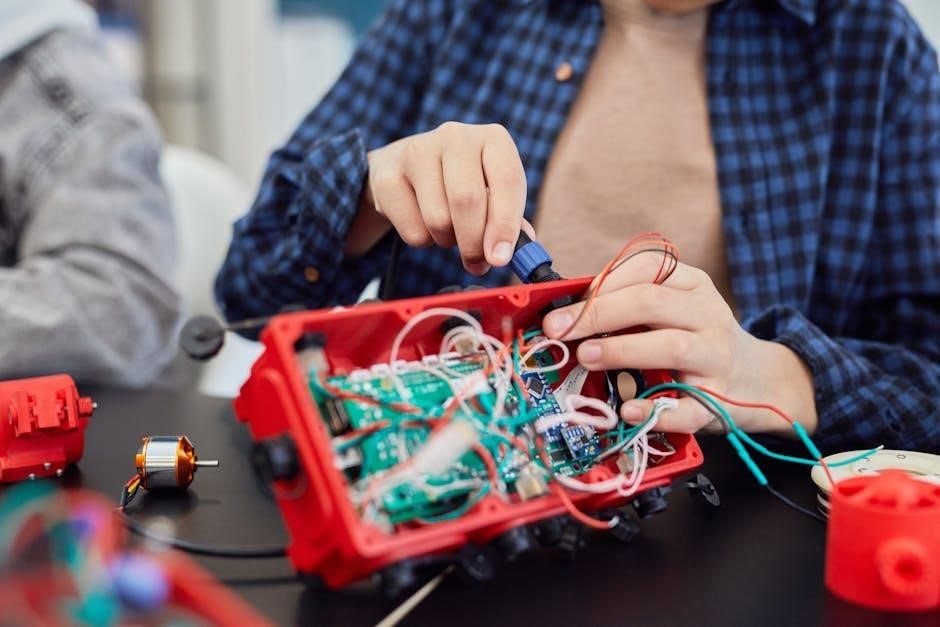Discover the evidence-based strategies to enhance learning and memory, rooted in cognitive psychology, as explored in Make It Stick: The Science of Successful Learning.
1.1 Overview of the Book “Make It Stick”
Make It Stick: The Science of Successful Learning by Peter C. Brown, Henry L. Roediger III, and Mark A. McDaniel challenges common myths about learning, offering evidence-based strategies to improve retention and understanding. Drawing on cognitive psychology, it explains how techniques like active recall and spaced repetition enhance learning, providing practical insights for students, educators, and lifelong learners.
1.2 Key Principles of Effective Learning
Effective learning relies on evidence-based strategies like active recall, spaced repetition, and deliberate practice. These methods enhance memory retention and understanding. Learning requires effort, and mistakes, when corrected, strengthen knowledge. Techniques such as interleaving and self-testing also improve long-term retention. These principles, backed by cognitive science, help learners achieve deeper understanding and lasting retention of information.

The Role of Memory in Learning
Memory is central to learning, as it stores and retrieves information. Effective strategies enhance retention, ensuring knowledge is accessible and applicable over time.
2.1 How Memory Works in the Learning Process
Memory plays a crucial role in learning by encoding, storing, and retrieving information. Effective encoding through active recall and spaced repetition strengthens memory traces, making knowledge retrieval easier and long-lasting. This process ensures that learned information is not just stored but also readily accessible for application in various contexts, enhancing overall learning efficiency and retention.
2.2 Strategies to Enhance Memory Retention
Effective strategies include active recall, spaced repetition, and deliberate practice. Active recall strengthens memory by testing knowledge. Spaced repetition reviews information at optimal intervals, preventing forgetting. Deliberate practice focuses on improving weak areas, enhancing long-term retention. These methods ensure information is deeply encoded, making it easier to retrieve and apply in real-world situations.
Effective Learning Techniques
Active recall, spaced repetition, and deliberate practice are proven techniques to enhance learning. These methods ensure information is retained and applied effectively, fostering long-term understanding and skill mastery.
3.1 Active Recall and Its Benefits
Active recall involves actively remembering information rather than passively re-reading it. Research shows it strengthens memory and understanding. By testing oneself, learners identify gaps and reinforce knowledge, making it a powerful tool for effective learning and long-term retention, as highlighted in Make It Stick: The Science of Successful Learning.
3.2 The Power of Spaced Repetition
Spaced repetition is a proven technique where information is reviewed at increasing intervals. This method enhances long-term retention by preventing forgetting and promoting deeper understanding. Unlike cramming, spaced repetition distributes learning over time, making it more efficient and effective, as discussed in Make It Stick: The Science of Successful Learning.
3.3 Deliberate Practice in Learning
Deliberate practice involves focused, structured, and effortful learning to improve specific skills or knowledge. It requires targeting weaknesses, receiving feedback, and continuously refining efforts. This method, rooted in cognitive psychology, ensures deep understanding and retention, making it a cornerstone of effective learning strategies discussed in Make It Stick: The Science of Successful Learning.

Cognitive Science and Learning
Cognitive science reveals how our brains process information, offering insights into effective learning strategies. Evidence-based techniques from Make It Stick enhance memory and understanding through scientifically proven methods.
4.1 The Science Behind Retrieval Practice
Retrieval practice strengthens memory by actively recalling information from memory rather than passively re-reading. Research shows that self-testing and spaced repetition improve long-term retention and understanding, making it a cornerstone of effective learning strategies discussed in Make It Stick: The Science of Successful Learning.
4.2 The Role of Dual Coding in Learning
Dual coding enhances learning by engaging both verbal and visual systems. According to Allan Paivio’s theory, combining text and images creates a stronger memory trace, improving retention and understanding. This approach, discussed in Make It Stick, leverages the brain’s ability to process information in multiple ways, making it a powerful tool for effective learning strategies.
4.3 The Impact of the Spacing Effect
The spacing effect boosts long-term retention by distributing learning over time. Revisiting material at increasing intervals strengthens memory traces, countering the forgetting curve. This evidence-based technique, supported by cognitive psychology, enhances neural consolidation, making learning more durable. It challenges the misconception that massed practice is superior, offering a scientifically proven method to optimize study schedules and improve knowledge retention effectively.

The Importance of Effort in Learning
Evidence shows that effort strengthens memory and understanding. Challenging tasks, like active recall, build resilience and deepen knowledge, proving that learning requires intentional practice and perseverance always.
5.1 The Concept of Desirable Difficulties
Desirable difficulties are intentional challenges that enhance learning by promoting deeper mental processing. Techniques like active recall and spaced repetition create productive struggles, strengthening memory and understanding. These strategies, though counterintuitive, are proven to improve long-term retention and neural connections, making learning more effective and durable over time.
5.2 The Role of Metacognition in Learning
Metacognition, or “thinking about thinking,” empowers learners to regulate their learning processes. By reflecting on strategies, monitoring progress, and adjusting approaches, individuals can optimize their learning. This self-awareness fosters better decision-making, leading to more efficient and effective learning outcomes. Cultivating metacognitive skills is crucial for achieving long-term academic success and intellectual growth.

Common Misconceptions About Learning
Challenging myths like rereading and passive learning, the book reveals that these methods are less effective than active strategies like self-testing and spaced repetition.
6.1 The Myth of Rereading and Rote Repetition
Rereading and rote repetition are often believed to enhance learning, but research shows they are counterproductive. These methods lack engagement, failing to strengthen memory or understanding. Cognitive psychology reveals that active recall and spaced repetition are far more effective, promoting deeper retention and long-term learning. Relying solely on passive techniques hinders progress, making learning less efficient.
6.2 The Misconception of Passive Learning
Passive learning, such as listening to lectures or reading, is often mistaken as effective. However, it lacks engagement, leading to shallow understanding. Research shows active techniques like self-testing and discussion are far more effective, as they engage the brain and promote deeper retention. Relying solely on passive methods can hinder learning and long-term memory retention significantly.
Applying the Science of Learning in Education
Evidence-based teaching methods, like active recall and spaced repetition, enhance student learning. These strategies, supported by cognitive science, help educators create engaging and effective learning environments.
7.1 Evidence-Based Teaching Methods
Evidence-based teaching methods, such as active recall and spaced repetition, significantly improve learning outcomes. These strategies, supported by cognitive science, encourage meaningful engagement and long-term retention. Techniques like self-testing and deliberate practice help students identify gaps in understanding, fostering deeper learning. By integrating these methods, educators can create structured, effective learning environments that align with the principles outlined in Make It Stick.
7.2 The Role of Feedback in Learning
Feedback is a critical component of effective learning, providing insights into strengths and areas for improvement. Immediate, constructive feedback helps learners adjust their understanding and strategies. Whether through teacher guidance or self-assessment, feedback fosters a growth mindset and enhances achievement. Regular feedback loops align with the principles of Make It Stick, promoting deeper learning and long-term retention.

The Role of Technology in Learning
Technology enhances learning through multimedia environments, online resources, and interactive tools, making education more accessible, effective, and engaging for students.
8.1 Multimedia Learning Environments
Multimedia learning environments combine text, images, simulations, and videos to enhance understanding and retention. These tools engage students, simplify complex concepts, and promote deeper learning through interactive and dynamic experiences, aligning with cognitive science principles to improve educational outcomes.
8.2 The Impact of Online and Blended Learning
Online and blended learning integrate digital tools with traditional methods, offering flexibility and personalized learning experiences. These approaches adapt to individual needs, enhance engagement, and improve academic performance. They also foster independent learning and critical thinking, supported by research from Make It Stick, emphasizing their role in modern education.
Real-World Applications of Learning Science
Techniques like active recall, spaced repetition, and deliberate practice, rooted in cognitive science, enhance learning efficiency in various real-world settings, benefiting students and lifelong learners alike.
9.1 Learning Strategies for Students
Active recall, spaced repetition, and self-testing are proven strategies that enhance students’ learning outcomes. These methods, supported by cognitive science, help build strong memory connections and improve long-term retention, enabling students to apply knowledge effectively in various academic and real-world scenarios.
9.2 Techniques for Lifelong Learners
Lifelong learners benefit from techniques like active recall, spaced repetition, and deliberate practice. These strategies, backed by cognitive science, help integrate new information into existing knowledge networks. By applying these methods, individuals can continuously build skills and adapt to new challenges, fostering intellectual growth and personal development throughout their lives.

Resources for Further Learning
Explore the Make It Stick PDF guide, additional recommended books, and online platforms offering evidence-based learning strategies to enhance your educational journey and lifelong learning.
10.1 The “Make It Stick” PDF Guide
The Make It Stick PDF guide offers practical techniques for effective learning, based on cognitive psychology. Authored by Peter C. Brown, Henry L. Roediger III, and Mark A. McDaniel, it provides evidence-based strategies like active recall and spaced repetition. Available for free download, it’s a valuable resource for students, educators, and lifelong learners seeking to enhance learning and retention.
10.2 Recommended Reading and Tools
Supplement your learning journey with resources like How Learning Works by Susan Ambrose and The Learning Brain by Karoline Spitzer. Tools like Anki for spaced repetition and Quizlet for interactive flashcards enhance retention; Explore platforms like Coursera and Khan Academy for structured courses. These tools, alongside Make It Stick, offer a comprehensive approach to mastering evidence-based learning strategies.
The science of successful learning offers evidence-based strategies like active recall and spaced repetition, proven to enhance retention and comprehension for learners of all levels.
11.1 Summary of Key Takeaways

Effective learning strategies, like active recall and spaced repetition, enhance retention. Mistakes and corrections build understanding. Rereading is counterproductive. Techniques from Make It Stick provide evidence-based methods to improve learning efficiency and long-term retention, empowering learners to adapt and succeed in various educational contexts.
11.2 Encouragement to Apply Learning Strategies
Embrace evidence-based techniques like active recall and spaced repetition to transform your learning journey. By applying these strategies, you empower yourself to retain information longer and learn more efficiently. Start small, stay consistent, and witness the profound impact on your academic and professional growth. The science of learning is your toolkit for lifelong success—use it wisely!
References and Further Reading
Explore the book Make It Stick: The Science of Successful Learning by Peter C. Brown and others for a comprehensive guide. Visit online platforms like Academia.edu for additional PDF resources and academic studies on learning strategies.
12.1 Academic Research and Studies
Academic studies and research from cognitive psychology highlight evidence-based learning strategies. Make It Stick by Peter C. Brown, Henry L. Roediger III, and Mark A. McDaniel offers insights into effective techniques like retrieval practice and spaced repetition. The book draws on decades of research, providing a scientific foundation for successful learning. Additional resources, such as PDF guides and academic papers on platforms like Academia.edu, further support these evidence-based methods.

